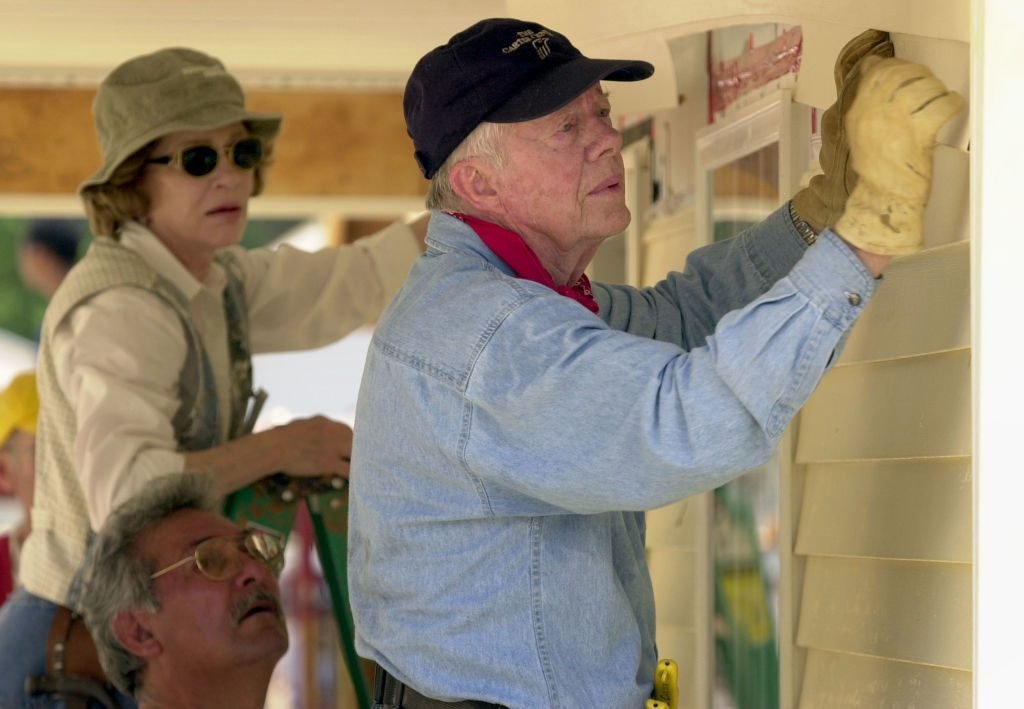
Jimmy Carter was a good dude.
Back to me: In the summer of 2023, I pitched a story about Jimmy Carter outliving his hospice welcome. Carter, the former president who died Sunday at 100 years old, had been in hospice for about six months when I made my pitch, and somehow seemed to be getting stronger in palliative care. I’d lived long enough and had enough personal experience with hospice to know that dying is the most stressful situation you’ll ever inflict on those around you. I hadn’t personally known any hospice enrollee to live anywhere near that long after going in; the lengthiest hospice stay I knew about was my buddy’s dad who lasted just under two weeks, and even that left the family feeling so beaten down they’d have all volunteered to put a pillow over his head to get it over with. Carter’s six-month run seemed downright cruel.
I admit I got giggles from watching the news reports about the then-98-year-old former president morph over time from standard hospice morbidity about how he was lying peacefully in his soon-to-be-deathbed surrounded by loved ones, to how he was eating lots of ice cream and going to street festivals in between reading tributes written about him. The second-wave stories read more like entries in a vacation journal than dispatches from death’s door. It occurred to me Carter might have so publicly announced he’d entered hospice not because the end was imminent, but because he had rather literally painted himself into a corner through his work for Habitat for Humanity and all his other good-dude deeds. Exaggerating the imminence of his demise was the only way he could experience retirement. Hospice meant no more requests to, say, build a house pro bono, or give advice on quelling turmoil in the Middle East, a couple of Carter’s bailiwicks in the last several decades of his amazing life. Love to, but I’m in hospice! Jimmy could now reply to anybody wanting his free labors. The unending and unchanging updates about the ex-president’s non-death struck me like an Opposite Land version of the Generalissimo Francisco Franco bit from the earliest days of Saturday Night Live, a gag that was huge as Carter was beginning his run for the presidency. Plus, I really liked typing “The Iron Man of Hospice.”
Alas, my pitch got rejected by editors who are smarter and better human beings than me.
And while knowing me as I know me, I can’t promise I wouldn’t have crossed into crass had the story been greenlit while Carter was still among the living. I really did and do have the fondest feelings possible for both the ex-president and hospice.
I mean, along with being the last honest politician and overall wondrous human being as he’s rightly being hailed as these days, Carter was the first guy I ever voted for. And I’d loved him for years before I was old enough to cast that ballot. I was born in Virginia in the early 1960s to parents who’d just moved from New York for work, but who despised the South and presented an ironclad case for its despicability throughout my childhood. Carter was the first Southern politician I could root for. (I still remember seeing our next-door neighbor wearing a styrofoam “Wallace for President” hat when I was in first grade.) Carter was backed by the Allman Brothers, Lynyrd Skynyrd, and all the other Southern rock acts that I, surely in some way as rebellion against my parents, loved as a lad. Discovering Live at Fillmore East from the Allmans, a multi-racial-when-it-meant-something band, in my brother’s record collection when he came home from college was a revelation. And my first unsupervised rock show was pre-crash Skynyrd at RFK Stadium in D.C. in May 1976, mere weeks before the band headlined “The Sunshine Jam” in Jacksonville, Fla., to fundraise for Carter’s first presidential campaign. (Here’s a surreal clip of Bob Dylan, another rocker friend of Carter, using Skynyrd lyrics to describe him.)
So I was real happy when Carter, later dubbed the first rock and roll president, beat fellow good dude but decidedly non-rock Gerald Ford in the fall of that year to become our 39th president. But he’d inherited an economically and psychically moribund country and did nothing to revive it. Instead of ever telling us things were going well or hiring people who’d do that for him, Carter went on live TV to say as a country we were on the highway to hell and admit he didn’t have all the answers. “This is not a message of happiness or reassurance,” he said during his so-called Malaise Speech alongside a laundry list of awful things about modern America, “but it is the truth, and it is a warning.” Thanks to Carter, it’s now accepted that we the people can’t handle the truth. Nothing went right for the poor guy. Just weeks after that speech, he took a fishing trip to his native Georgia in hopes of getting a break from the crippling impact unemployment and interest rates were causing his re-election chances, and got attacked by a killer rabbit. Then came the Iran Hostage Crisis and related gasoline shortages and price hikes. Even with my first vote, he got landslided in Virginia and nationally by Ronald Reagan in 1980.
As much as I love Carter, I love hospice even more. The care that folks with the D.C. office of hospice provided my mother in 2014 at the end of her life leaves me with debts no honest man can pay. She’d spent several weeks in hospitals fighting lots of ailments that could kill her, during which she’d made me and my brother and sister all promise repeatedly that we’d make sure the plug got pulled the minute she wasn’t having fun. So when sepsis went to her brain and she became uncommunicative we asked the hospice folks if we could take her home to die, and within hours I was riding with mom in an ambulance to her house, the same house I grew up in. That ride was the saddest, lowest point of my life. I was met at the house by a smiling woman from hospice who gave us all the most helpful and brutal lecture I’ve ever gotten: “First off: It’s over!” she told us, still smiling. “There is no hope! There will be no recovery! Your mother is going to die! The second thing is: We have more drugs than she has pain!”
The hospice folks helped us set Mom up in her own bedroom, and she spent her last three days lying peacefully and (given the infection and rock-star levels of morphine administered) probably oblivious as lots of neighbors and old friends came by to say nice things to us about her. Damn if that reverse pep talk from the hospice boss didn’t turn out to be exactly what we needed to hear. Accepting the wisdom of her self-styled malaise speech allowed us to spend the time we had left being grateful for the days we’d had instead of hoping for days that would never come. As far as life’s worst times go, thanks to hospice and others, the whole experience ended up being sort of wonderful.
But again, even after just three days we were all completely worn out. I can’t imagine what toll a death watch as long as Carter’s would take on a soul or family. He lived 680 days, or more than 22 months, after the announcement that he was going into hospice. Hell, the Iran hostages, who put the final nail on the coffin of his presidency, were only held 444 days. But his hanging around gave the world time to think about him and his life. Again, back to me: This fall, I was thinking of Carter as I donated my mom’s old car, a 2003 Toyota with 150k miles which I’d held on to since her death but hadn’t been driven in years, to Habitat for Humanity. I’m prouder of my rejected story pitch on the Iron Man of Hospice. I gotta say, that pitch aged well. RIP, Jimmy.






